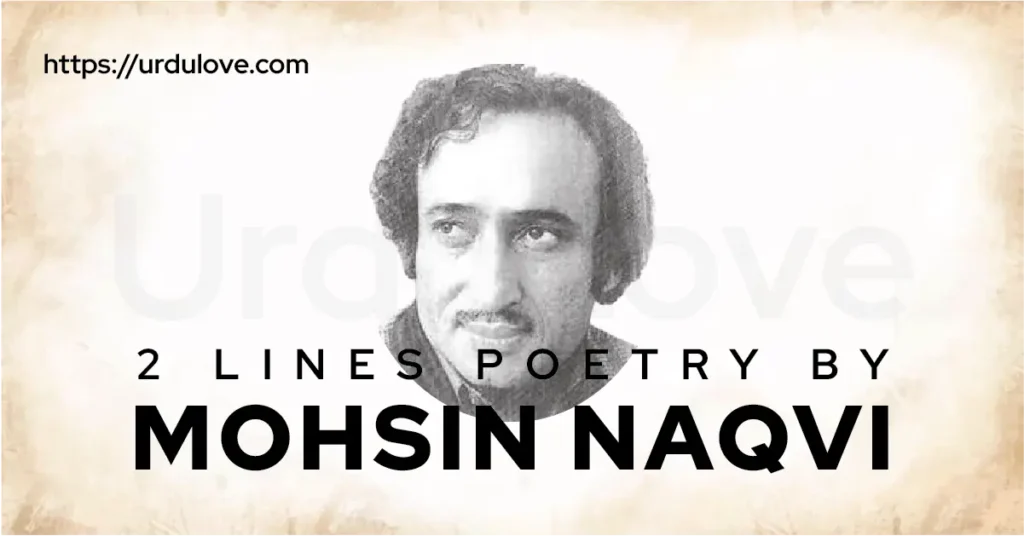Mohsin Naqvi was born on 10 May 1947 in Dera Ghazi Khan, Punjab, British India (now in Pakistan) as Ghulam Abbas Naqvi. He later adopted the pen name “Mohsin Naqvi,” which became synonymous with his soulful poetry and profound expressions. Known for his mastery of Urdu literature, Mohsin Naqvi’s poetry is celebrated for its delicate balance between classical grace and contemporary relevance. His verses explore themes of love, heartbreak, social injustice, and the complexities of human emotions, making him a beloved figure across generations.
In his memory, we bring to you a collection of his timeless works, highlighting his iconic two-line poetry (Ashaar) that captures the depth of his thoughts in just a few words. These gems of Urdu literature not only showcase his genius but also serve as a tribute to the legacy of a poet whose words continue to touch hearts and inspire minds. Let us dive into the beautiful world of Mohsin Naqvi’s poetry and cherish his unforgettable contributions to Urdu literature.
Mohsin Naqvi's 2 line Poetry Collections
Poetry: 1

Arabic Urdu Version
ہر وقت کا ہنسنا تجھے برباد نہ کر دے
تنہائی کے لمحوں میں کبھی رو بھی لیا کر
Transliteration
Har waqt ka hansna tujhe barbaad na kar de
Tanhai ke lamhon mein kabhi ro bhi liya kar
English Translation Version
Do not let your constant laughter ruin you,
In moments of solitude, sometimes let your tears fall.
Explanation
This verse by Mohsin Naqvi speaks to the delicate balance between emotional strength and vulnerability, advising against masking pain with constant laughter. To delve deeper into the themes of emotional complexity and introspection found in this verse, read the full ghazal “Ujray Hue Logon Se Gurezaan Na Hua Kar” here.
Poetry: 2
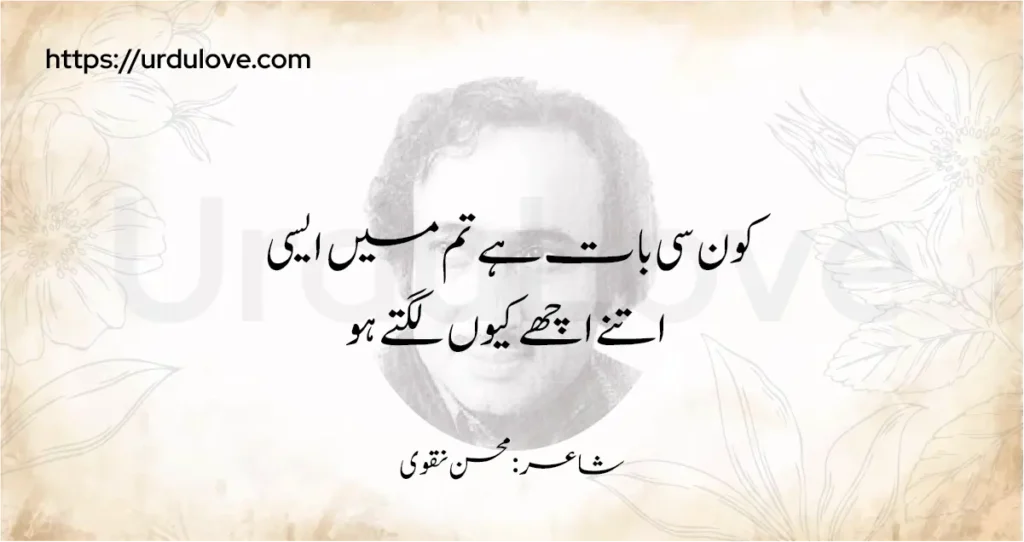
Arabic Urdu Version
کون سی بات ہے تم میں ایسی
اتنے اچھے کیوں لگتے ہو
Transliteration
Kaun si baat hai tum mein aisi
Itne achhe kyun lagte ho
English Translation Version
ADD TRANSLATION
Explanation
This verse by Mohsin Naqvi captures the charm and allure that captivates the heart. To explore the full ghazal, filled with themes of longing and admiration, read the complete ghazal “Itni Muddat Baad Mile Ho” here.
Poetry: 3
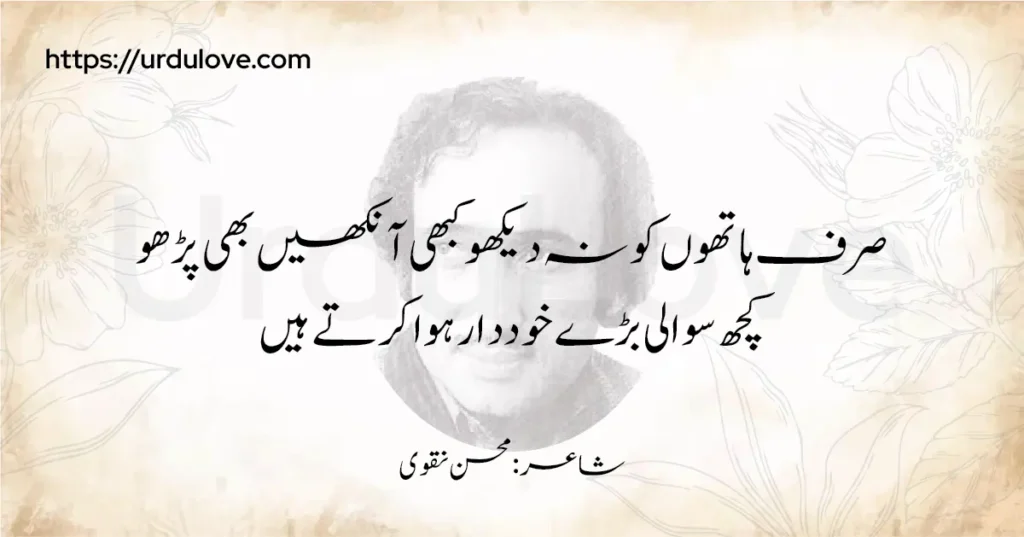
Arabic Urdu Version
صرف ہاتھوں کو نہ دیکھو کبھی آنکھیں بھی پڑھو
کچھ سوالی بڑے خوددار ہوا کرتے ہیں
Transliteration
Sirf haathon ko na dekho, kabhi aankhein bhi parho
Kuch sawaali bade khuddar hua karte hain
English Translation Version
ADD TRANSLATION
Explanation
This verse captures the idea that sometimes, pride and silent questions are hidden behind a person’s actions. For more on the complexities of human expression and emotions in poetry, check out my post on understanding the depth of human emotions in poetry.
Ghazal : Marhale shauq ke dushwaar hua karte hain
Poetry: 4
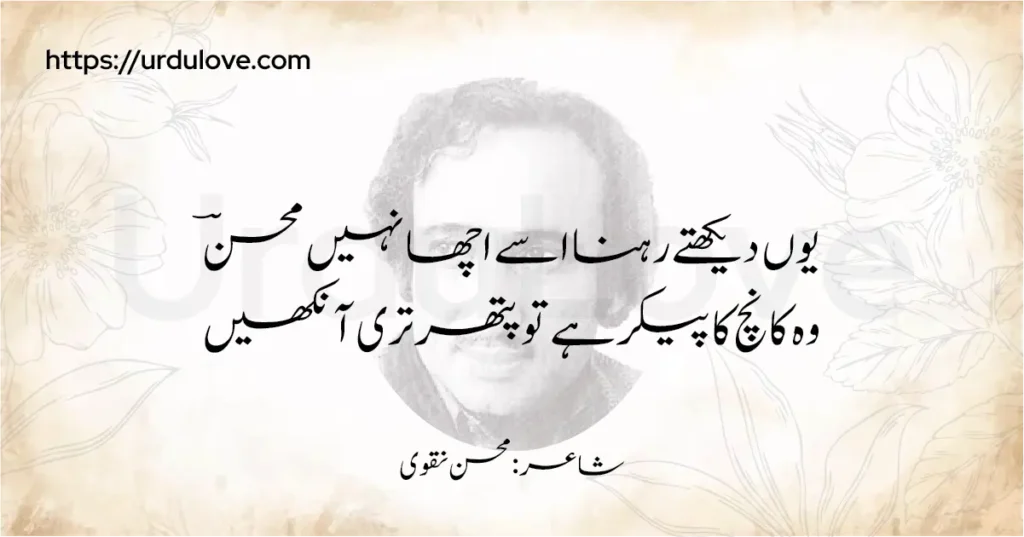
Arabic Urdu Version
یوں دیکھتے رہنا اسے اچھا نہیں محسنؔ
وہ کانچ کا پیکر ہے تو پتھر تری آنکھیں
Transliteration
Yun dekhte rehna usey acha nahi Mohsin
Woh kaanch ka paikar hai, tu pathar teri aankhein
English Version
ADD TRANSLATION
Explanation
This verse by Mohsin Naqvi captures the charm and allure that captivates the heart. To explore the full ghazal, filled with themes of longing and admiration, read the complete ghazal “Itni Muddat Baad Mile Ho” here.
Poetry: 5
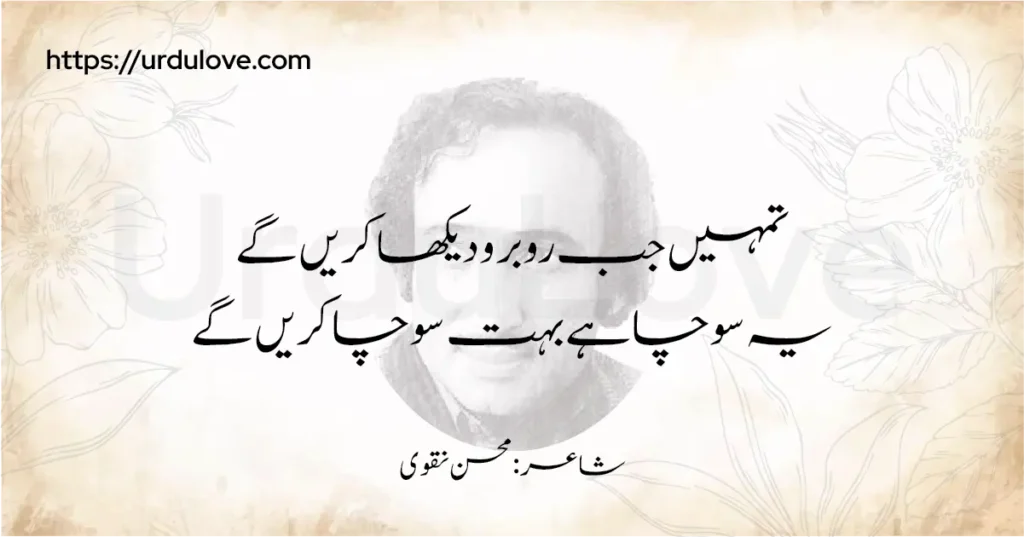
Arabic Urdu Version
تمہیں جب روبرو دیکھا کریں گے
یہ سوچا ہے بہت سوچا کریں گے
Transliteration
Tumhe jab rubaru dekha kareinge
Yeh socha hai, bohot socha kareinge
English Translation Version
ADD TRANSLATION
Explanation
This verse captures the depth of thought and anticipation before an encounter. To explore more about the power of anticipation and love in poetry, read my post on the emotional weight of encounters.
Ghazal : Tumhe jab rubaru dekha kareinge
Poetry: 6
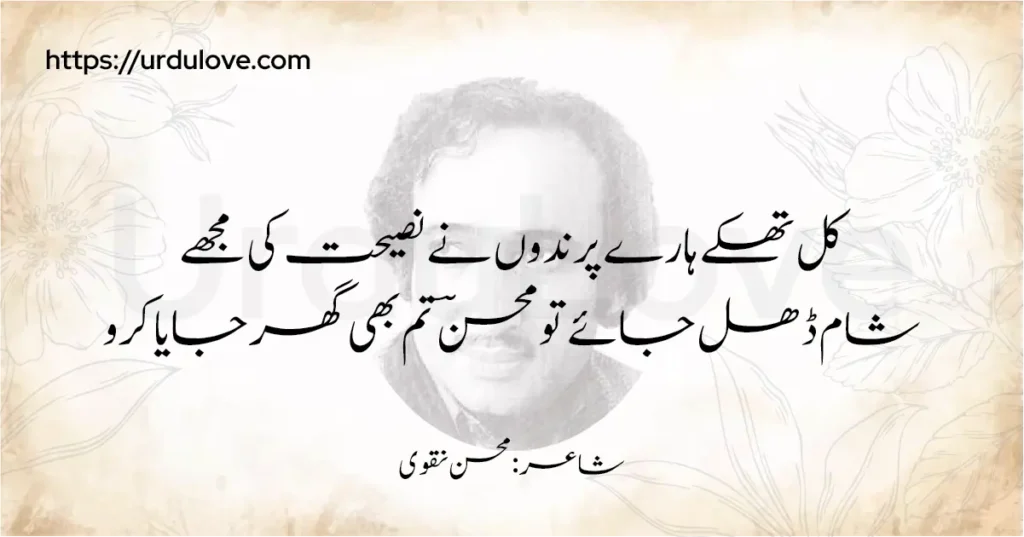
Urdu Version
کل تھکے ہارے پرندوں نے نصیحت کی مجھے
شام ڈھل جائے تو محسنؔ تم بھی گھر جایا کرو
Transliteration
Yun dekhte rehna usey acha nahi Mohsin
Woh kaanch ka paikar hai, tu pathar teri aankhein
English Translation Version
ADD TRANSLATION
Explanation
This verse by Mohsin Naqvi captures the charm and allure that captivates the heart. To explore the full ghazal, filled with themes of longing and admiration, read the complete ghazal “Itni Muddat Baad Mile Ho” here.
Poetry: 7
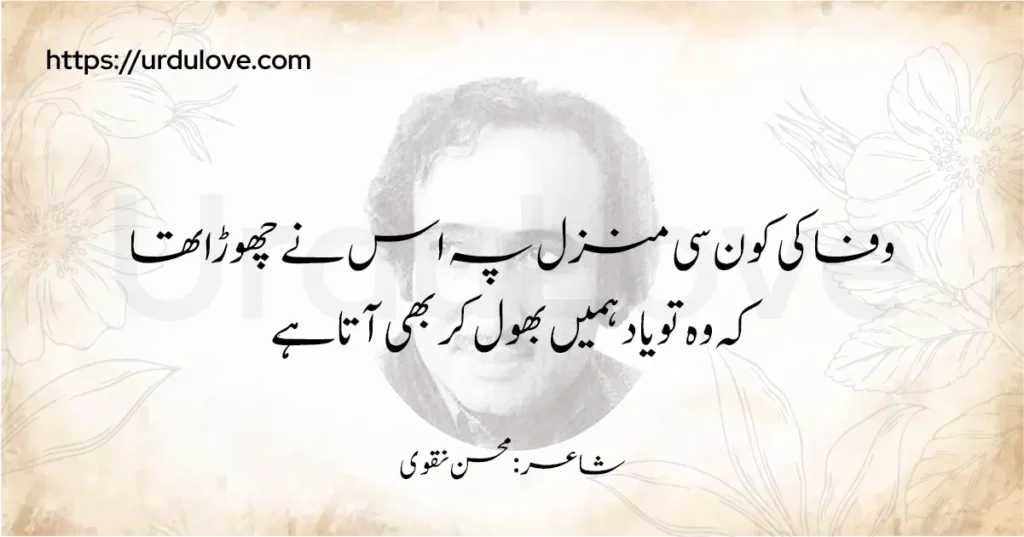
Arabic Urdu Version
وفا کی کون سی منزل پہ اس نے چھوڑا تھا
کہ وہ تو یاد ہمیں بھول کر بھی آتا ہے
Transliteration
Wafa ki kon si manzil pe usne chhoda tha
Ke woh to yaad humein, bhool kar bhi aata hai
English Translation Version
ADD TRANSLATION
Explanation
This verse speaks to the timeless presence of love and memory, lingering even after separation. To explore more about the enduring power of love and remembrance in poetry, visit my post on emotional connections and lasting memories in poetry.
Ghazal : tire badan se jo chhū kar idhar bhī aatā hai
Poetry: 8
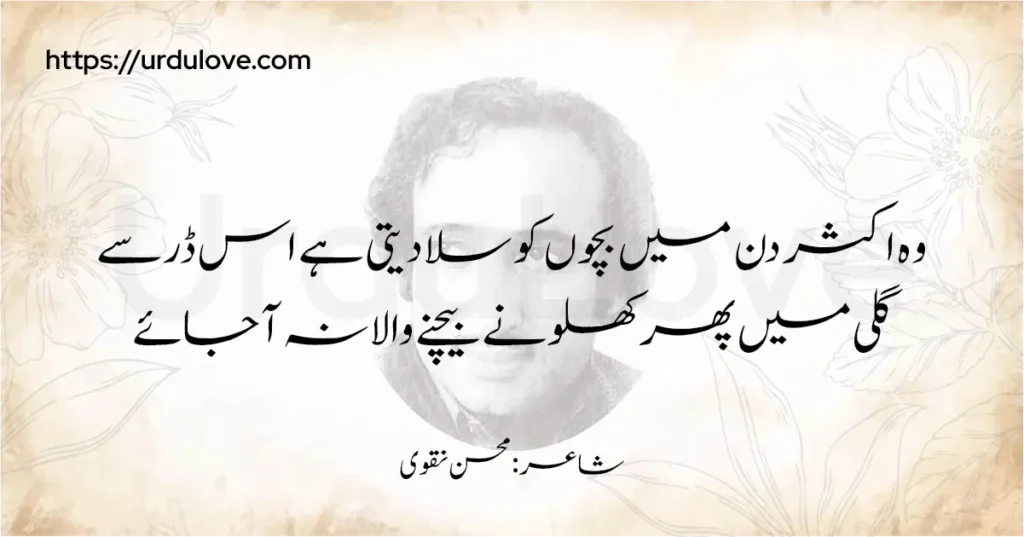
Arabic Urdu Version
وہ اکثر دن میں بچوں کو سلا دیتی ہے اس ڈر سے
گلی میں پھر کھلونے بیچنے والا نہ آ جائے
Transliteration
Woh aksar din mein bachon ko sula deti hai is dar se
Gali mein phir khilone bechne wala na aa jaye
English Translation Version
ADD TRANSLATION
Explanation
This verse beautifully depicts a mother’s protective nature, ensuring her children remain untouched by outside distractions. To explore more on themes of protective love and emotional bonds in poetry, read my post on the strength of parental protection in poetry.
Poetry: 9

Arabic Urdu Version
جب سے اس نے شہر کو چھوڑا ہر رستہ سنسان ہوا
اپنا کیا ہے سارے شہر کا اک جیسا نقصان ہوا
Transliteration
Jab se usne shehar ko chhoda, har rasta sunsaan hua
Apna kya hai, saare shehar ka ek jaisa nuqsan hua
English Translation Version
ADD TRANSLATION
Explanation
This verse encapsulates the collective loss and emptiness felt in a city after someone’s departure. To dive deeper into themes of loss and the emotional impact of absence in poetry, explore my post on the emotional void and effects of loss in poetry.
Poetry: 10
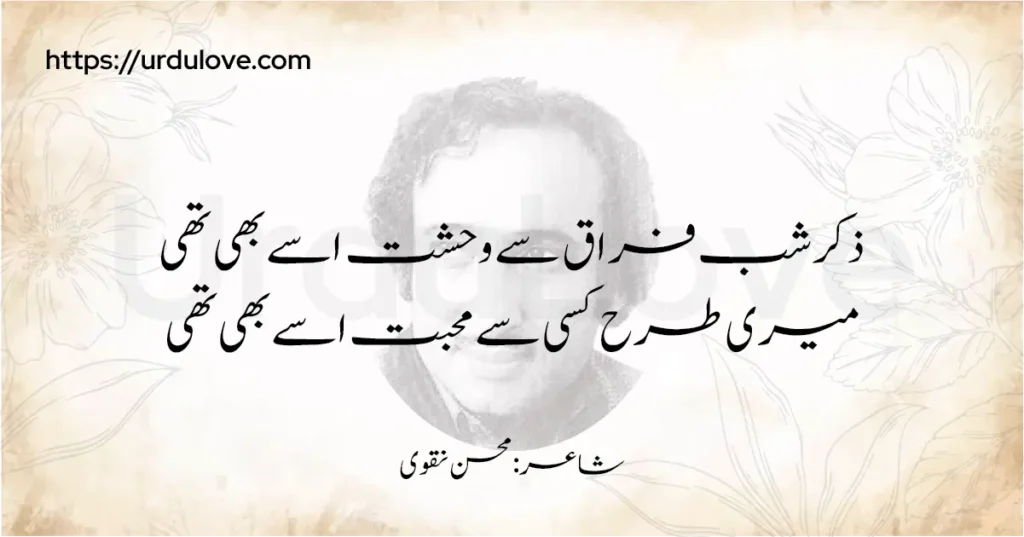
Urdu Version
ذکر شب فراق سے وحشت اسے بھی تھی
میری طرح کسی سے محبت اسے بھی تھی
Transliteration
Zikar shab-e-firaq se wahshat usey bhi thi
Meri tarah kisi se mohabbat usey bhi thi
English Translation Version
ADD TRANSLATION
Explanation
This verse beautifully portrays the shared agony of separation and the deep connection formed through love. To delve deeper into themes of separation and emotional longing in poetry, read my post on the shared pain of love and longing in poetry.
In Conclusion
Mohsin Naqvi’s poetry is a timeless treasure that continues to touch hearts and evoke emotions. His ability to capture profound thoughts and feelings in just a few words is a testament to his mastery of the craft. Through his two-line poetry, he painted vivid pictures of love, heartbreak, and the human experience, resonating with readers across generations.
We hope this collection inspires you to dive deeper into his works and cherish the legacy of a poet whose words remain as relevant and meaningful today as ever. Let’s keep his memory alive by sharing and celebrating his beautiful verses with the world.

